
A specialized area of medicine called psycho-oncology concentrates on the psychological, social, and emotional effects of cancer and cancer therapy. In order to enhance the quality of life for cancer patients and their families, entails integrating psycho-psychological and behavioral therapies into cancer care.
Numerous topics regarding cancer and its treatment are covered by psycho-oncology, including:
- Managing the psychological effects of a cancer diagnosis
- Managing depression, anxiety, and other mental health conditions
- Dealing with family and healthcare providers' communication and relationship problems
- Handling the psychological and physical repercussions of cancer therapy
- Supporting patients' and families' grieving and end-of-life care.
Children, teenagers, young adults, and older individuals are only a few of the demographics affected by cancer, and psycho-oncology is aware of the significance of treating their particular needs and experiences.
A multidisciplinary team of healthcare specialists, including oncologists, psychologists, social workers, and other mental health providers, frequently provides psycho-oncology. Together, these specialists offer thorough, coordinated care that considers the physical, emotional, and social requirements of cancer patients and their loved ones throughout the journey. Bottom of Form
Types of Psycho-Oncology
Psycho-oncology therapies come in a variety of forms and can be used to help cancer patients and their families. The following are some typical forms of psycho-oncology:
- . Psychotherapy: Talk therapy is used in psychotherapy to assist cancer patients and their families in addressing the emotional and psychological difficulties associated with the disease and its treatment. Cognitive-Behavioral therapy (CBT), supportive psychotherapy, and mindfulness-based therapies are among the psychotherapy types that may be applied in psycho-oncology.
- . Psychiatric drugs: Patients with cancer may be given psychiatric "PSYCHOONCOLOGY COUNSELLING ONLINE "drugs to assist them to control their mood and anxiety problems. Examples include antidepressants and anti-anxiety drugs.
- Support groups: Support groups unite people with cancer and their families to exchange stories, offer assistance to one another, and foster a sense of community. Both trained volunteers and medical professionals can lead support groups.
- . Palliative care: --Palliative treatment focuses on symptom management and comforting cancer patients. It may also involve assistance with psychological needs
- End-of-life care: End-of-life care involves helping patients and the best therapist in India and their families get through the toughest times in life. Support for existential or spiritual questions as well as helpful assistance for families and carers may be included in this.
- Mind-body therapies: Patients with cancer may benefit from using mind-body practices like acupuncture, yoga, or meditation to better control their stress and suffering.
- Family therapy: Family therapy aims to enhance communication, resolve conflicts, and strengthen the family as a whole by involving family members in the therapeutic process.
It's crucial to remember that the psycho-oncology interventions utilized may change depending on the requirements and preferences of specific patients and their families, the stage and kind of cancer, as well as. A multidisciplinary healthcare team can collaborate with patients and families to create a specialized treatment plan that considers their particular requirements and objectives.
Benefits Of Online Counselling For Psycho-Oncology
Online psycho-oncology counseling offers a number of advantages that can make it a useful and practical choice for cancer patients and their families:
- . Greater accessibility: Online counseling makes psycho-oncology treatments more accessible, especially for people who may be unable to travel to in-person appointments owing to mobility restrictions, geographic limitations, or other health challenges.
- Convenience and adaptability: Patients and their families can get online therapy at a time that is convenient for them from the comfort of their own homes.
- . Less stigma: Because online counseling offers more privacy and anonymity, it might help lessen the stigma attached to obtaining mental health care.
- . Personalized support: With access to a variety of specialized providers and services, online therapy may be customized to match the specific needs and preferences of individual patients and their families.
- Greater participation: Patients who might be hesitant to seek out conventional in-person counseling may find that online counseling increases their participation and engagement in psycho-oncology therapies.
- . Cost-effective: Due to the lack of travel fees and other associated costs, online therapy may be a more affordable choice for patients and families.
- . Shorter wait times: Patients may be able to access support more quickly with online therapy because it may have shorter wait times than conventional in-person counseling.
Online counseling may not be appropriate for everyone, especially for those who may need more extensive or specialized treatment, but it's crucial to remember. A healthcare professional can collaborate with patients and their families to choose the best course of action for their particular needs and preferences.
How can Psycho-Oncology help
There are various ways that psycho-oncology might benefit cancer patients and their families:
- 1. Managing emotional and psychological difficulties: Psycho-oncology therapies can assist patients and families in managing the emotional and psychological difficulties associated with cancer, such as anxiety, depression, and distress.
- 2. Improving the quality of life: By addressing concerns with physical symptoms, social support, and coping mechanisms, psycho-oncology therapies can assist in enhancing the quality of life for cancer patients and their families.
3. Resolving concerns with relationships and communication: Psycho-oncology therapies can aid in enhancing connections and communication with family members, medical professionals, and others, lessening feelings of loneliness.

No comments yet